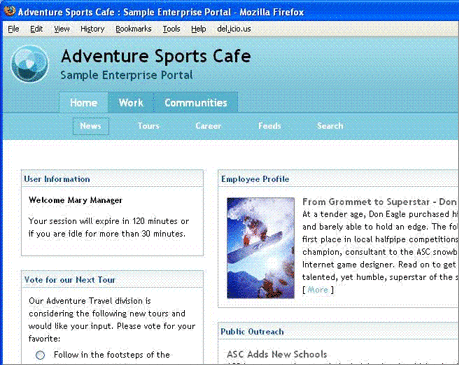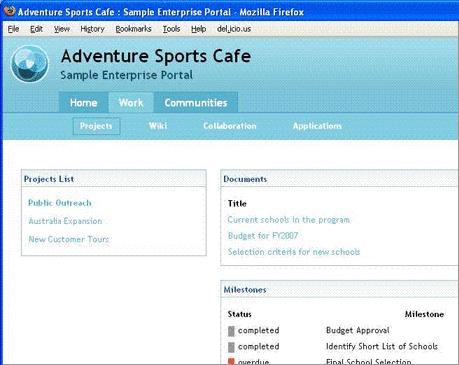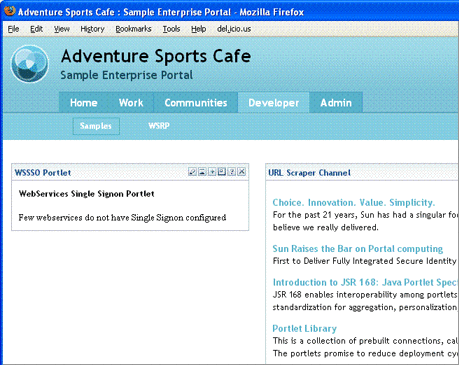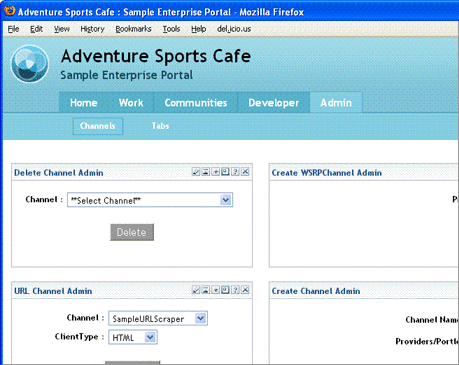Sample Enterprise Portal Server Tabs
The Enterprise Sample portal desktop includes three primary tabs available to mary, chris and ed:
- The Home Tab
-
The Home tab showcases news (employee profile, customer favorites, recipes), tour information, career information, travel and health rss feeds, and site search.
- The Work Tab
-
The Work tab showcases projects, a wiki, collaboration (discussions and subscriptions), and applications.
- The Communities Tab
-
The Communities tab allows end users to create and join communities, and interact with other community members through a set of collaborative portlet applications (community services).
The user chris has two additional primary tabs:
- The Admin Tab
-
The Admin tab showcases task admin features for channel and tab administration.
- The Developer Tab
-
The Developer tab showcases miscellaneous technologies of interest to a developer.
The Home Tab
The Home tab features the following sub-tabs.
Figure 2–2 Enterprise Sample Home Tab

- News
-
This is the first tab a user sees when they login to the Enterprise Sample. This tab is AJAX enabled and showcases the following channels:
-
The User Information channel informs the user how long his/her session will be active and allows the user to specify their common name, greeting, time zone, and password. This channel is based on the UserInfoProvider.
-
The Vote for our Next Tour channel allows a user to vote for a tour. This channel is based on the JSPProvider.
-
The Customer Favorites channel details customers' favorite tours and provides a link to more information on each tour. This channel is based on the JSPProvider.
-
The Employee Profile channel highlights an employee with a short summary in the channel and a More link to the full article. This channel is based on an XML portlet that reads an XML file and performs an XSL translation to present the data. This portlet is available in the portlet repository.
-
The Public Outreach channel highlights outreach activities and provides a More link to the full article. This channel is based on an XML portlet that reads an XML file and performs an XSL translation to present the data. This portlet is available in the portlet repository.
-
The What's Cooking channel details recipes collected from around the world and provides a link to more information for each recipe. This channel is based on the JSPProvider.
The following channels are not visible on the desktop, but are accessible from the Page Preferences link:
-
The Flickr channel shows photos from Flickr. This channel is based on the JSPProvider.
-
The Yahoo! Traffic channel provides traffic information from Yahoo! This channel is based on the JSPProvider.
-
The Client Invoices channel demonstrates how AJAX techniques can be used in a portlet. This channel is based on the ajax portlet available in the portlet repository.
-
- Tours
-
This tab is AJAX enabled and showcases JSR-286 or Portlet 2.0 Eventing. Select a tour in the Tour Listing channel and the Tour Detail, Tour Map, and Tour Weather channels are updated with information relevant to that tour. The portlets are available in the portlet repository.
- Career
-
This tab is AJAX enabled and provides Career information for the employee. The Employee Benefits, Certifications, Job Listings, Employee Travel, and Employee Discount channels all provide links to information. These channels are based on an XML portlet that reads an XML file and performs an XSL translation to present the data. The Things To Do channel allows the end user to create a categorized list of things to do. This channel is based on a notepad portlet that is available in the portlet repository.
- Feeds
-
This tab is not AJAX enabled and it showcases Travel and Health RSS feeds. This channel is based on a RSS portlet that is available in the portlet repository.
- Search
-
This tab is AJAX enabled and showcases the portal search features.
The Work Tab
The Work tab features the following sub-tabs.
Figure 2–3 Enterprise Sample Work Tab

- Projects
-
This tab is AJAX enabled and showcases role based content delivery and inter-channel communication. The Projects List channel displays projects that the user is a member of. Membership is determined by the user's one or more roles. When the user selects a project, the Documents, Members, and Milestones channels are updated with the project details. All the channels on this page are based on the JSPProvider.
- Wiki
-
This tab is not AJAX enabled and showcases a Wiki. The wiki allows an end user to include a portlet in the page.
- Collaboration
-
This tab is not AJAX enabled and showcases collaboration. The end user can view, start, find, and subscribe to Discussions. The Discussions and Recent Discussions channels are based on the DiscussionProvider and the Subscriptions channel is based on the SubscriptionsProvider.
- Applications
-
This tab is not AJAX enabled and showcases applications the end that the user can launch.
-
The My Applications channel provides a list of admin defined applications the user can launch. This channel is based on the AppProvider.
-
The My Bookmarks channel allows the user to manage a set of bookmarks. This channel is based on a bookmark portlet that is available in the portlet repository.
-
The Netlet channel is a channel accessible through the gateway and allows the end user to launch netlet targets. This channel is based on the NetletProvider.
-
The Proxylet channel is a channel accessible through the gateway and allows the end user to admin defined proxylet targets. This channel is based on the ProxyletProvider.
-
The Instant Messaging channel allows the end user to launch the Sun Instant Messenger client. This channel is based on the IMProvider.
-
The Communities Tab
The portal collaboration feature allows end users to create and join communities, and interact with other community members through a set of collaborative portlet applications (community services). Communities are, therefore, an association of members and services. These services are: file share, shared tasks & events, polls & surveys, wiki, discussions, and blog. For more information on these services, see Part XI, Service Providers and Portlets, in Sun Java System Portal Server 7.2 Technical Reference.
Communities are created and managed by end-users. The user can be in one or more roles (visitor, owner, member, invited, pending, rejected). The community owner can set the access control on the community content, membership, and visibility of the community. The owner of the community can also remove the community or transfer ownership of the community. For more information, see Managing a Portal Server Community in Sun Java System Portal Server 7.2 Administration Guide.
The portal administrator can define community templates that defines the layout mechanism and the available services, and end-users can create communities within categories using the available templates. See Understanding Community Templates in Sun Java System Portal Server 7.2 Administration Guide for more information. Users must join to take part in community collaboration.
Each portal will have its own set of communities. Communities within a portal will only be visible to users in that portal. The community users are stored in a relational database, one database instance per portal (see Chapter 9, Managing Java DB for Portal Server, in Sun Java System Portal Server 7.2 Installation and Configuration Guide for more information).
This tab showcases the following channels:
-
The My Communities channel lists the communities that the user is a member of or an owner of.
-
The Communities channel allows the user to create a new community or find a community.
The Developer Tab
Figure 2–4 Enterprise Sample Developer Tab

The Developer tab features the following sub-tabs:
- Samples
-
The Samples tab showcases channels that may be of interest to a developer. For example, web services single sign-on, URL scraping, iFrame, Java Server Faces (JSF).
- WSRP
-
This tab showcases the WSRP channel which provides web services for remote portlets.
The Admin Tab
Portal Server enables portal administrators to delegate the responsibility for managing various tasks in a particular organization to other individuals, called delegated administrators. Decentralizing administrative functions can improve portal management, especially in complex organizations. Portal administrators can set up channels for delegated administrators to use for managing the Desktop. To perform administration tasks, delegated administrators use a set of administrative portlets on the Portal Server Desktop. The Admin tab contains the administrative portlets for delegated administrators.
Figure 2–5 Enterprise Sample Admin Tab

For more information on delegated administration, see Part IV, Managing Delegated Administration, in Sun Java System Portal Server 7.2 Administration Guide.
- © 2010, Oracle Corporation and/or its affiliates
